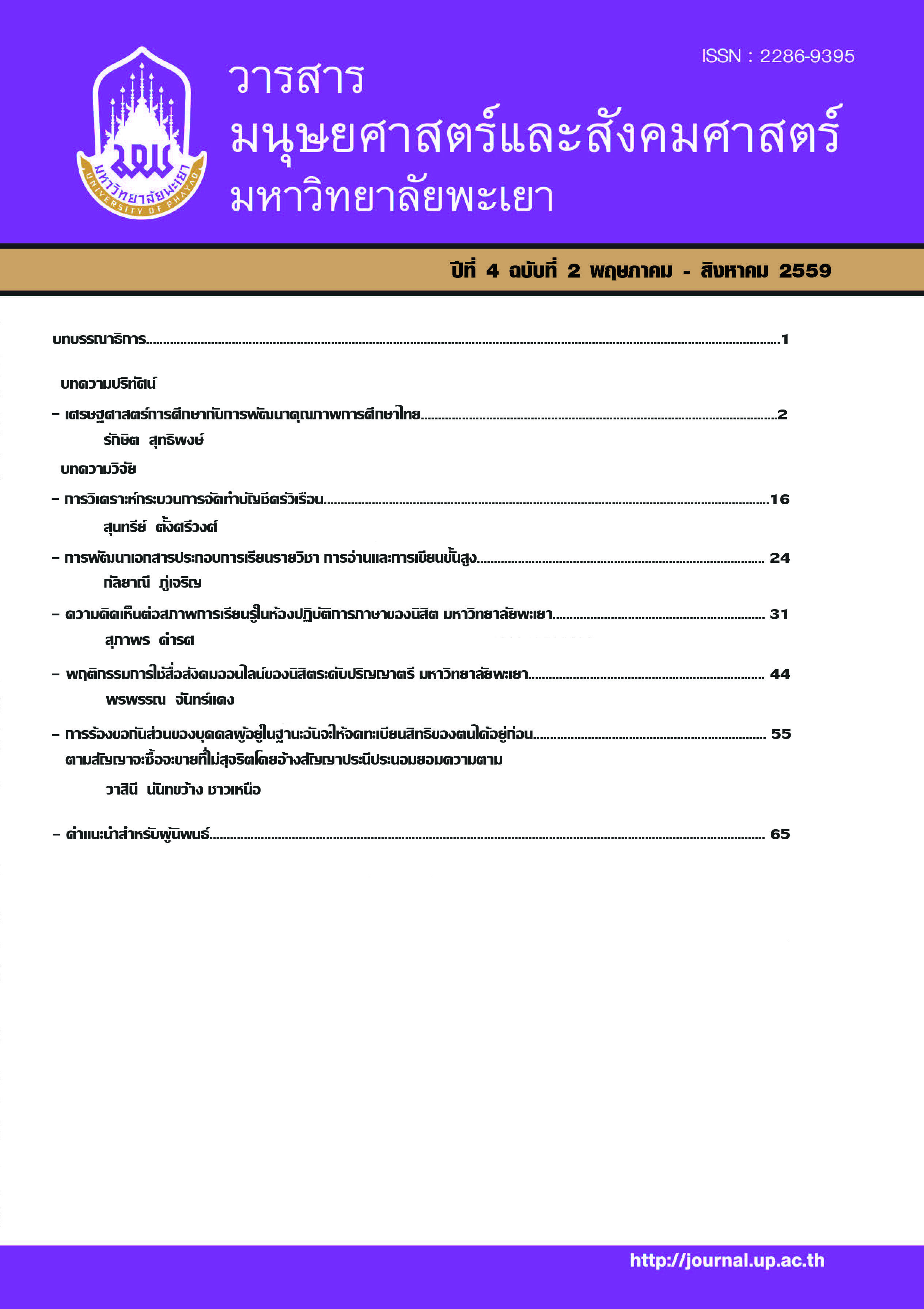The Right to not be Affected by Execution of Judgement Against Property of Judgment Debtor of a Person Who Was Previously in a Position to Have His Right Registered by Claiming a Compromised Judgment Which the Parties Signed an Agreement to Sell or to buy made in bad faith or by fraudulent act
Keywords:
The right to not be affected by execution of judgement against property of judgment debtor, A person who was previously in a position to have his right registered, An agreement to sell or to buy, Fraudulent act, Compromise agreementAbstract
The purpose of this research is to 1) to study the principles of being a person who has preferential rights or other rights over any executed property of a judgment debtor under section 287 of the Civil Procedure Law Code only in aspects of a person who was in position to have his right registered under section 1300 of the Civil and Commercial Law Code. 2) to study the court's guideline in considering any cases before making a judgment or order where the request of a person who has preferential rights or other rights over the property of a judgment debtor by referencing the privilege of a compromise judgment is being filed. 3) to search for any protections and solutions for a judgment creditor against a preferential person who dishonestly applies his such rights. To do this, the researcher is considering through the principles of claiming preferential rights over executed property of a judgment debtor, judgments, as well as through a qualitative study known as "Concept Paper"; including scrutinizing all related documents, interviewing an officials and persons in civil proceedings (i.e. judges, executing officers, and judgment creditors).
The outcome of the research reveals that many judgment creditors have not been able to exercise their rights over the property of a judgment debtor especially in the circumstances where the judgment debtor and the third person firstly signed contract or compromise judgment with an intention to fraud a judgment creditor, and secondly claiming their preferential rights or other rights against a judgment creditor to the court, at last the judge believe the false documents and make a judgment that property in dispute as such belongs to the third person and issue an order to release the property. At this point, the judgment creditor is not entitled to get performance from the property of such debtor. It is clearly that both of the Civil and Commercial Law Code and civil proceedings, in practice, sometimes could not protect the right of a judgment creditor, but it also widely opens opportunities to a judgment debtor and a third person to take advantages from gaps in the law. The main obstacle to achieve fairness in such cases is that law users lack of knowledges in supervising the evidences in order to prove whether the parties proceed the case in good faith or not. With this ignorance, it brings about nightmares to a judgment creditor. To do this, it could be easily starting with revising the guideline of court in considering a compromise judgment more deliberately before making judgment or order; such as applying the power of the court to call for such essential evidences in regarding to issues of the cases as 'court's evidences'.
References
ไกรฤกษ์ เกษมสันต์. คำอธิบายประมวลกฎหมายอาญาภาคความผิด มาตรา 288 ถึง 366. พิมพ์ครั้งที่ 7. กรุงเทพฯ:สำนักอบรมศึกษากฎหมายแห่งเนติบัณฑิตยสภา;2554. หน้า 360-371.
ประเสริฐ เสียงสุทธิวงศ์. สัมมนากฎหมายวิธีพิจารณาความแพ่ง. กรุงเทพฯ: อภิโชติ; 2558.
วิเชียร ดิเรกอุดมศักดิ์. กฎหมายแพ่งพิสดาร เล่ม 4 (ฉบับปรับปรุงใหม่ ปี 2559). กรุงเทพฯ: แสงจันทร์การพิมพ์; 2559.
วิเชียร ดิเรกอุดมศักดิ์. กฎหมายวิ.แพ่งพิสดาร เล่ม 2 (ฉบับปรับปรุงใหม่ ปี 2559). กรุงเทพฯ: แสงจันทร์การพิมพ์; 2559.
วิเชียร ดิเรกอุดมศักดิ์. กฎหมายวิ.แพ่งพิสดาร เล่ม 3 (ฉบับปรับปรุงใหม่ ปี 2559). กรุงเทพฯ: แสงจันทร์การพิมพ์; 2559.
วิเชียร ดิเรกอุดมศักดิ์. กฎหมายอาญาพิสดาร เล่ม 2 (ฉบับปรับปรุงใหม่ปี 2559). พิมพ์ครั้งที่ 1. กรุงเทพฯ:แสงจันทร์การพิมพ์;2559. หน้า 469-484.
สมชัย ฑีฆาอุตมากร. สัมมนากฎหมายวิธีพิจารณาความแพ่ง 1. กรุงเทพฯ: กรุงสยาม พับลิชชิ่ง จำกัด; 2559.
สมชัย ฑีฆาอุตมากร. สัมมนากฎหมายวิธีพิจารณาความแพ่ง 2. กรุงเทพฯ: พลสยาม พริ้นติ้ง (ประเทศไทย); 2558.
สมชัย ฑีฆาอุตมากร. สัมมนากฎหมายวิธีพิจารณาความแพ่ง 3. กรุงเทพฯ: กรุงสยาม พับลิชชิ่ง จำกัด; 2559.
เสนีย์ ปราโมช. ประมวลกฎหมายแพ่งและพาณิชย์ ว่าด้วยนิติกรรมและหนี้ เล่ม 1 (ภาค 1-2). พิมพ์ครั้งที่ 3. กรุงเทพฯ:วิญญูชน จำกัด;2559. หน้า 40-100.
อุดม เฟื่องฟุ้ง. คำอธิบายประมวลกฎหมายวิธีพิจารณาความแพ่ง ภาค 1 ตอน 2. พิมพ์ครั้งที่ 7. กรุงเทพฯ: กรุงสยาม พับลิชชิ่ง จำกัด; 2555.
สมยศ เชื้อไทย, คำอธิบายวิชากฎหมายแพ่ง หลักทั่วไป (กรุงเทพฯ: สำนักพิมพ์วิญญูชน จำกัด; 2555), หน้า 153.
วิเชียร ดิเรกอุดมศักดิ์, กฎหมายแพ่งพิสดาร เล่ม 4 (ฉบับปรับปรุงใหม่ ปี 2559) (กรุงเทพฯ: แสงจันทร์การพิมพ์; 2559), หน้า 230.
ประเสริฐ เสียงสุทธิวงศ์, สัมมนากฎหมายวิธีพิจารณาความแพ่ง (กรุงเทพฯ: อภิโชติ; 2558), หน้า 374-382.
สราวุธ ปิติยาศักดิ์, คำอธิบายกฎหมายลักษณะทรัพย์ (กรุงเทพฯ: สำนักพิมพ์นิติธรรม, 2555), หน้า 77.
Published
How to Cite
Issue
Section
License
ผู้นิพนธ์ต้องรับผิดชอบข้อความในบทนิพนธ์ของตน มหาวิทยาลัยพะเยาไม่จำเป็นต้องเห็นด้วยกับบทความที่ตีพิมพ์เสมอไป ผู้สนใจสามารถคัดลอก และนำไปใช้ได้ แต่จะต้องขออนุมัติเจ้าของ และได้รับการอนุมัติเป็นลายลักษณ์อักษรก่อน พร้อมกับมีการอ้างอิงและกล่าวคำขอบคุณให้ถูกต้องด้วย
The authors are themselves responsible for their contents. Signed articles may not always reflect the opinion of University of Phayao. The articles can be reproduced and reprinted, provided that permission is given by the authors and acknowledgement must be given.








